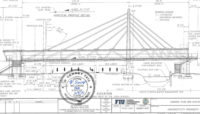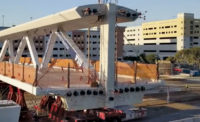A federal court judge in Washington, D.C., has rejected a motion by FIGG Bridge Engineers and W. Denney Pate to temporarily block the U.S. Dept. of Transportation’s suspension of both the firm and the engineer from working on projects involving federal funding. The ruling is the latest in FIGG’s fight to avoid a 10-year federal debarment proposed as a result of the firm’s role in the fatal March 2018 bridge collapse at Florida International University in Miami. FIGG says it will continue its fight.
DOT’s Federal Highway Administration had suspended and proposed to debar Pate, FIGG’s engineer-in-charge for the Florida bridge project—and a co-plaintiff in the court action.
The Aug. 17 ruling by Judge Colleen Kollar-Kotelly stated that, separately, FIGG and Pate had “not demonstrated a likelihood of success on the merits, irreparable harm absent preliminary relief, or that the balance of the hardships and the public interest weigh in their favor.”
In its Aug. 11 court filing, FIGG Bridge Engineers and, separately, Pate, had claimed that the U.S. DOT’s proposed suspensions, issued July 14, “pose a threat of catastrophic and imminent harm” to FIGG “that cannot be reversed if the suspensions are allowed to continue during” the debarment process.
Additionally, in its motion, FIGG claimed that the contractor that retained FIGG, Munilla Construction Management, bore responsibility for the collapse because it damaged the partly assembled structure when rolling it into position and that the contractor failed to communicate the seriousness of cracks that appeared to the engineering firm.
In her ruling, Kollar-Kotelly states that Figg’s principal argument of irreparable harm “derives from the economic loss it expects the FHWA suspension to cause.” However, the firm failed to make the case that the “economic harm it faces because of the FHWA suspension is actual and not theoretical.”
For instance, according to the judge, FIGG and Pate failed to make the case for this economic harm in two ways. First, FIGG’s argument relied on three existing contracts, which are not affected by the debarment. Moreover, company projects in Texas and South Dakota are both state-funded and therefore also not affected.
For those reasons, the judge was not convinced that these pre-existing contracts “demonstrate any concrete harm posed by the FHWA suspension.”
A National Transportation Safety Board investigation report last year blamed several companies for their roles in the tragedy but reserved its harshest criticism for FIGG.
Of the NTSB report, the ruling noted: “The removal of the FHWA suspension could not entirely erase the industry stigma associated with this NTSB report, nor could it prevent that report from serving as an impediment to securing prospective contracts. For these reasons, Figg’s economic theory of harm is simply too speculative.”
A statement provided to ENR by FIGG noted: “While the initial ruling by a federal judge to deny FIGG Bridge Engineers’ request for a temporary restraining order is disappointing, the company is looking ahead to pursuing all possible avenues to remedy the actions by the FHWA that FIGG believes were incorrect.”





